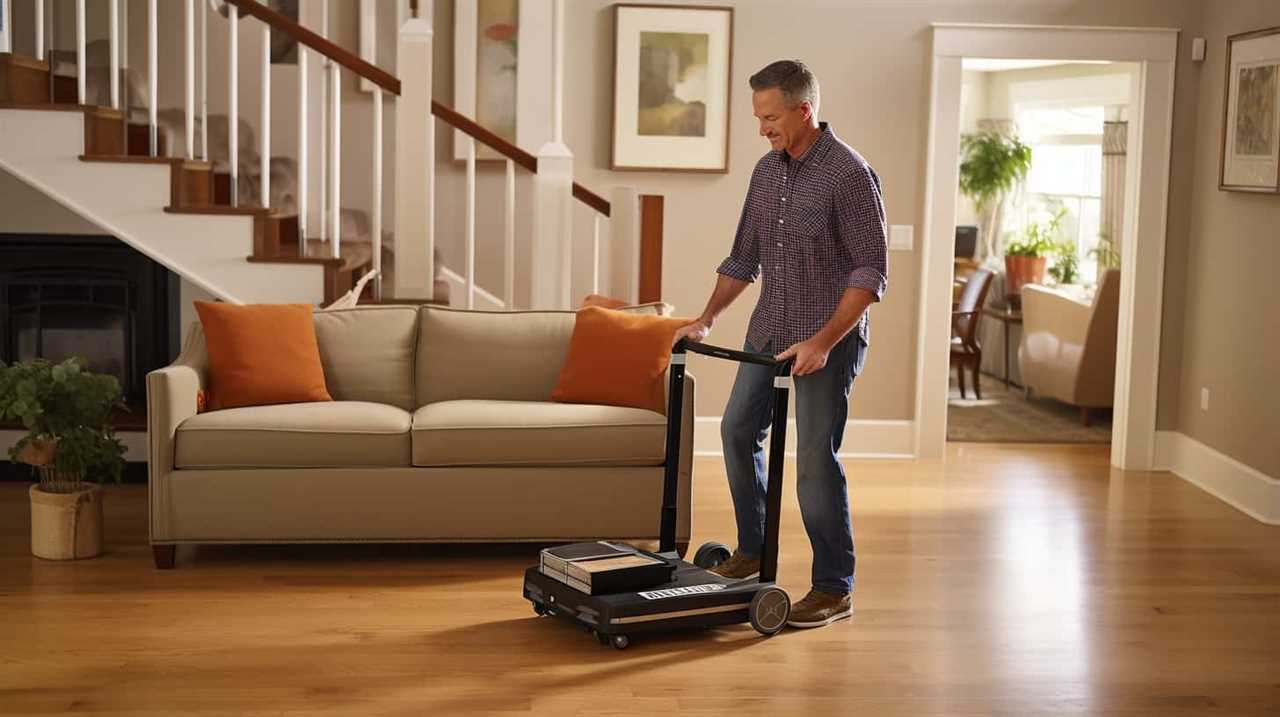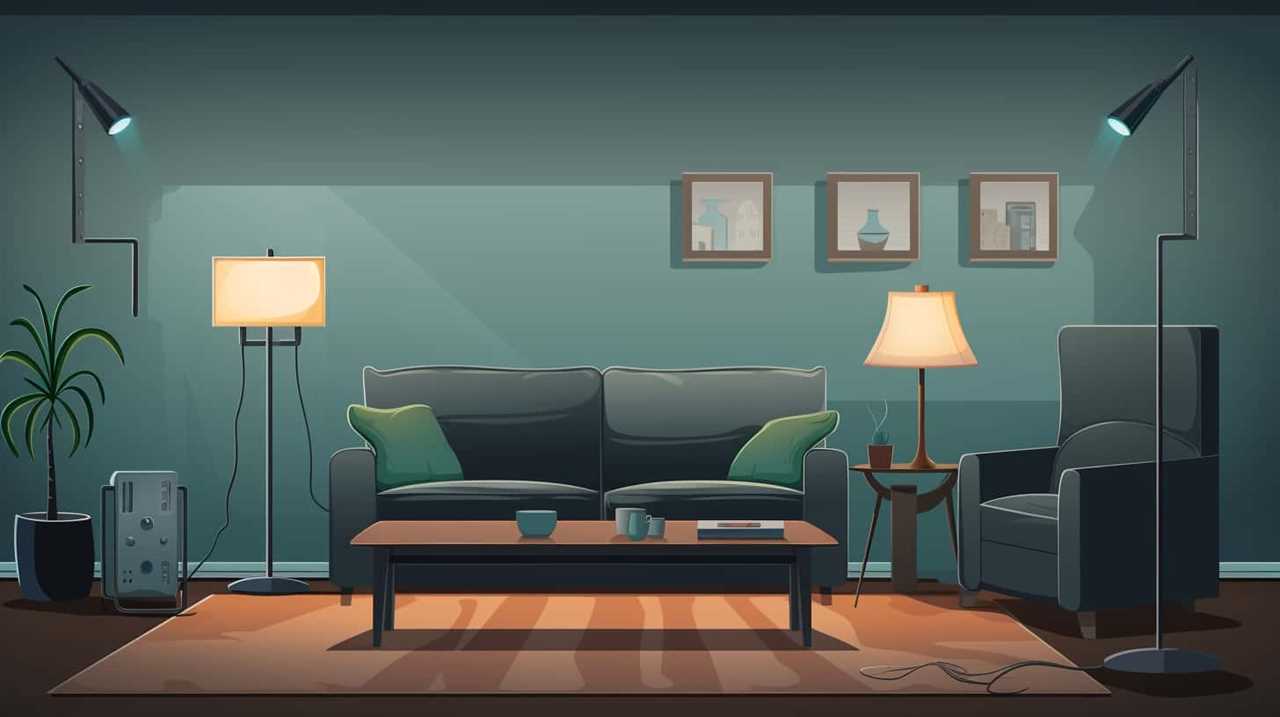When looking to save money on our energy bills, many may question the wisdom of running appliances at night. This article explores the idea of off-peak hours and examines the potential benefits of cost savings.
By considering factors such as energy consumption and savings, we can make an informed decision. We will also explore strategies for maximizing cost savings and alternative ways to reduce energy costs.
Let’s uncover the truth behind running appliances at night and its impact on our wallets.
Key Takeaways
- Running appliances during off-peak hours can take advantage of lower energy rates.
- Shifting energy usage to off-peak hours allows for more efficient resource utilization.
- Time-of-use rates offer lower electricity rates during off-peak hours.
- Running appliances at night can significantly impact energy consumption and savings.
Understanding Energy Rates and Peak Hours
To understand energy rates and peak hours, we need to examine the cost fluctuations and usage patterns that occur throughout the day. Evaluating the cost effectiveness of running appliances at night requires a thorough understanding of how energy rates fluctuate during different times of the day.

Energy rates are typically higher during peak hours when the demand for electricity is at its highest. By running appliances during off-peak hours, such as at night, you may be able to take advantage of lower energy rates, resulting in potential cost savings.
Additionally, running appliances at night can have a positive impact on the environment. During off-peak hours, there’s typically less strain on the electrical grid, reducing the need for additional energy production and potentially decreasing greenhouse gas emissions.
Understanding energy rates and peak hours is crucial for making informed decisions about when to run appliances to maximize cost savings and minimize environmental impact.
The Concept of Off-Peak Hours
During off-peak hours, we can take advantage of lower energy rates by running appliances at night. Off-peak hours refer to the periods when the demand for electricity is lower. Typically, these hours occur at night, when most people are asleep and the demand for energy is at its lowest.

By running appliances during these hours, we can reduce our energy consumption and save money on our electricity bills. This is one of the energy-saving strategies that can be implemented to manage peak demand. The concept of off-peak hours allows us to shift our energy usage to times when the cost of electricity is lower, resulting in cost savings and a more efficient use of resources.
Understanding and utilizing off-peak hours can contribute to an overall reduction in energy consumption and a more sustainable approach to energy usage.
Evaluating the Cost-Saving Potential
We can assess the cost-saving potential by analyzing our electricity usage patterns and comparing the rates during off-peak hours to determine the potential savings of running appliances at night. Here are some key points to consider when evaluating the cost-saving potential:
- Time-of-use rates: Many utility companies offer lower rates during off-peak hours, typically at night. By shifting our appliance usage to these times, we can take advantage of these lower rates and potentially reduce our electricity bills.
- Energy-efficient appliances: Investing in energy-efficient appliances can further enhance the cost-saving potential. These appliances are designed to consume less energy, resulting in lower electricity bills.
- Impact on the environment: Running appliances at night can also have a positive impact on the environment. By reducing our energy consumption during peak hours, we can help alleviate the strain on the power grid and reduce greenhouse gas emissions.
- Overall energy saving tips: Apart from running appliances at night, there are other energy-saving tips we can implement, such as using power strips, adjusting thermostat settings, and properly insulating our homes.
Considering these factors, running appliances at night can potentially save money and have a positive impact on the environment. However, there are other factors to consider before making this decision.

Factors to Consider Before Running Appliances at Night
Before running appliances at night, there are several factors that should be considered.
One of the main factors to evaluate is the cost benefits. Running appliances during off-peak hours can potentially lead to lower electricity rates, resulting in savings on your monthly energy bill.
However, it’s important to weigh these potential savings against the potential risks. For example, running certain appliances, such as washing machines or dishwashers, at night may cause noise disturbances for you or your neighbors.
Additionally, some appliances may require a longer running time at night to complete their cycles, which could offset any potential cost benefits.

It’s crucial to carefully evaluate these factors before deciding to run your appliances at night.
Considering the impact on energy consumption and savings, let’s explore further in the next section.
Impact on Energy Consumption and Savings
Running appliances at night can have a significant impact on our energy consumption and potential savings. To understand the effects of running appliances at night, it’s important to consider the following:
- Off-peak rates: Many utility companies offer lower electricity rates during non-peak hours, such as nighttime. By taking advantage of these rates, we can reduce our energy costs.
- Reduced demand: Running appliances at night helps to distribute the energy load more evenly throughout the day. This can lead to a decrease in overall demand during peak hours, which can help to stabilize the grid and promote sustainable living.
- Energy-saving habits: Running appliances at night encourages us to adopt energy-saving habits, such as using energy-efficient appliances and setting timers. These habits can contribute to long-term energy savings and a more sustainable lifestyle.
- Potential savings: By shifting our appliance usage to off-peak hours, we may be able to achieve significant cost savings on our energy bills over time.
Considering the impact on energy consumption and potential savings, it’s important to explore the role of smart meters in tracking energy usage.

The Role of Smart Meters in Tracking Energy Usage
To continue our discussion on the impact of running appliances at night on energy consumption and savings, let’s delve into the role of smart meters in tracking our energy usage. Smart meter technology has revolutionized the way we monitor and manage our energy consumption. These advanced devices provide real-time data on our energy usage, allowing us to track and analyze our consumption patterns more effectively. By installing a smart meter in our homes, we gain valuable insights into which appliances or activities contribute the most to our energy bills. This information empowers us to make informed decisions about our energy usage, enabling us to optimize efficiency and reduce costs. Let’s take a closer look at the benefits of smart meter technology in the table below.
| Benefits of Smart Meter Technology |
|---|
| Real-time data on energy usage |
| Ability to track consumption patterns |
| Empowers informed decision-making |
Comparing Nighttime Rates With Daytime Rates
We can compare nighttime rates with daytime rates to determine the potential cost savings of running appliances at night. Understanding nighttime rates and comparing energy usage can help us make informed decisions about when to use our appliances. Here are four key factors to consider:
- Time-of-use rates: Many utility companies offer different rates depending on the time of day. Nighttime rates are often lower because there’s less demand for electricity during those hours.
- Peak demand: Daytime rates are typically higher due to peak demand. By running appliances at night, when demand is lower, we can take advantage of lower rates.
- Energy-intensive appliances: Appliances that consume more energy, such as air conditioners and electric heaters, can be more expensive to run during the day. Running them at night can lead to significant cost savings.
- Off-peak hours: Nighttime hours are considered off-peak, meaning the demand for electricity is lower. This can result in lower rates for running appliances during these hours.
Types of Appliances That Benefit From Nighttime Usage
During nighttime hours, certain appliances can benefit from lower rates and reduced energy consumption. Two examples are nighttime cooking and overnight laundry. By utilizing these appliances during off-peak hours, homeowners can take advantage of cost savings and contribute to energy conservation efforts.
Nighttime cooking involves using appliances such as slow cookers, rice cookers, and electric ovens to prepare meals while sleeping. These appliances can be set on a timer to start cooking late in the evening, allowing for a delicious meal to be ready by morning. This not only saves time during busy mornings but also reduces energy usage during peak hours.

Similarly, overnight laundry involves running washing machines and dryers during the night. By doing laundry during off-peak hours, homeowners can benefit from lower electricity rates and avoid contributing to peak energy demand during the day.
Below is a table showcasing the types of appliances that can be used during nighttime hours for cost savings and reduced energy consumption.
| Type of Appliance | Benefits of Nighttime Usage |
|---|---|
| Slow Cooker | Saves time and reduces energy usage during peak hours |
| Rice Cooker | Allows for a delicious meal to be ready by morning |
| Electric Oven | Reduces energy consumption and contributes to energy conservation |
| Washing Machine | Takes advantage of lower electricity rates |
| Dryer | Avoids contributing to peak energy demand during the day |
Potential Risks and Drawbacks of Running Appliances at Night
When considering the potential risks and drawbacks of running appliances at night, there are a few key points to keep in mind.
Firstly, noise and disturbance can be a significant issue, especially if you have light sleepers in your household. Running appliances during the night can disrupt sleep and lead to a less restful night for everyone.

Secondly, running appliances at night can result in increased energy consumption, particularly if you’re on a time-of-use electricity plan where rates are higher during peak hours.
It’s important to weigh these potential drawbacks against the potential cost savings before deciding to run appliances at night.
Noise and Disturbance
While running appliances at night can save money, it’s important to consider the potential risks and drawbacks of noise and disturbance. Here are four reasons why noise pollution and sleep disruption should be taken into account:
- Sleep quality: Running appliances can create noise that disrupts sleep, leading to poor sleep quality and potential health issues.
- Sleep disturbances: Loud noises from appliances can cause frequent awakenings during the night, resulting in fragmented sleep and daytime fatigue.
- Impact on cognitive function: Sleep disruption caused by appliance noise can impair cognitive function, affecting concentration, memory, and productivity.
- Overall well-being: Continuous exposure to noise pollution can have negative effects on mental and physical well-being, leading to increased stress levels and decreased quality of life.
Considering these potential drawbacks, it’s important to weigh the benefits of saving money against the potential negative impacts on sleep and overall well-being.

Increased Energy Consumption
Running appliances at night can result in increased energy consumption, which comes with potential risks and drawbacks. When evaluating energy efficiency, it is important to consider the impact on the environment. While running appliances at night may seem convenient, it can lead to higher electricity bills and contribute to overall energy wastage. To illustrate the potential drawbacks, let’s consider the following table:
| Risks | Drawbacks | Impact on Environment |
|---|---|---|
| Higher electricity bills | Increased carbon footprint | Increased demand on power plants |
| Overloading electrical circuits | Reduced equipment lifespan | Increased greenhouse gas emissions |
| Noise pollution during sleeping hours | Potential fire hazards | Depletion of natural resources |
As can be seen from the table, running appliances at night can have negative consequences. Therefore, it is crucial to consider strategies for maximizing cost savings, which will be discussed in the next section. Transitioning into the subsequent section, let’s explore effective ways to minimize energy consumption and save money.
Strategies for Maximizing Cost Savings
To maximize cost savings, we can adopt effective strategies when operating our appliances at night. Here are four energy-saving strategies that can help us save money:
- Utilize programmable timers: By setting our appliances to run during off-peak hours, we can take advantage of lower electricity rates. This allows us to save money while still enjoying the convenience of using our appliances.
- Optimize energy-efficient settings: Many appliances have energy-saving modes or settings that can help reduce their power consumption. By evaluating the effectiveness of these settings and using them appropriately, we can further lower our energy usage and save on costs.
- Consolidate appliance usage: Instead of running multiple appliances at different times, we can consolidate our usage to minimize energy waste. For example, running the dishwasher and washing machine together can be more efficient than running them separately.
- Regular maintenance and upgrades: Keeping our appliances well-maintained and up to date with energy-efficient models can result in significant cost savings. Regularly cleaning filters and replacing old appliances with energy-efficient ones can reduce energy consumption and lower our utility bills.
Alternative Ways to Reduce Energy Costs
When it comes to reducing energy costs, there are alternative ways to consider.

One option is to switch to efficient lighting options, such as LED bulbs, which use less energy and last longer than traditional incandescent bulbs.
Additionally, investing in energy-saving appliances can also help lower electricity usage and save money in the long run.
Efficient Lighting Options
At night, we can save money on energy costs by utilizing efficient lighting options. Here are four options to consider when evaluating the cost-saving potential:
- LED Bulbs: LED bulbs are highly energy-efficient and can last up to 25 times longer than traditional incandescent bulbs. They consume less power and emit very little heat, making them an ideal choice for reducing energy costs.
- Compact Fluorescent Lamps (CFLs): CFLs are another energy-efficient lighting option. They use around 75% less energy than incandescent bulbs and have a longer lifespan. CFLs are available in various sizes and can be used in different fixtures.
- Motion Sensor Lights: Installing motion sensor lights in outdoor areas can significantly reduce energy consumption. These lights only turn on when they detect movement, ensuring that energy isn’t wasted when not needed.
- Daylighting: Maximizing natural light by strategically placing windows and skylights can reduce the need for artificial lighting during the day. This can result in substantial energy savings.
By implementing these efficient lighting options, we can reduce energy costs while still maintaining adequate lighting levels.

Now, let’s move on to the next section about energy-saving appliances.
Energy-Saving Appliances
Now let’s explore energy-saving appliances as another way to reduce our energy costs.
Energy-saving appliances are designed with advanced energy-saving technology to minimize electricity consumption while still providing the necessary functionality. These appliances, such as refrigerators, washing machines, and air conditioners, are built with features that optimize energy efficiency and reduce wastage.
By investing in energy-efficient appliances, we can significantly lower our energy bills over time. These appliances often have energy star ratings, indicating their high efficiency levels.

Energy-saving appliances not only save money but also help reduce our carbon footprint, making them a sustainable choice for those seeking to reduce their environmental impact. By incorporating energy-efficient appliances into our homes, we can take an active role in conserving energy and promoting a greener future.
This sets the stage for the subsequent section on tips for optimal energy efficiency at all times.
Tips for Optimal Energy Efficiency at All Times
To ensure optimal energy efficiency at all times, we recommend implementing these simple tips:
- Evaluate your energy usage: Start by conducting an energy audit of your home. Identify areas where energy is being wasted and make necessary changes. Consider installing energy-saving devices such as smart thermostats and LED lights.
- Use energy-efficient appliances: When purchasing new appliances, look for the ENERGY STAR label. These appliances are designed to consume less energy and can significantly reduce your electricity bills.
- Practice smart energy habits: Turn off lights and unplug electronics when not in use. Adjust your thermostat to a comfortable yet energy-saving temperature. Use natural lighting during the day and make use of curtains or blinds to regulate room temperature.
- Utilize energy-saving settings: Many appliances and electronics have energy-saving modes. Enable these settings to minimize energy consumption without sacrificing functionality.
Making an Informed Decision: Is It Worth It?
When considering the question of whether running appliances at night saves money, there are a few key points to consider.

Firstly, understanding your energy consumption patterns is crucial in determining whether this strategy will be beneficial.
Secondly, it’s important to weigh the potential cost savings against the convenience factor of running appliances during the day.
Lastly, making an informed decision requires analyzing the specific circumstances and energy rates in your area to determine if running appliances at night is truly worth it.
Energy Consumption Patterns
In considering energy consumption patterns, we can determine if running appliances at night is worth it. To help us make an informed decision, let’s look at the potential nighttime savings and understand energy-saving tips.

Here are four key factors to consider:
- Time-of-use rates: Some utility companies offer lower electricity rates during off-peak hours, such as at night. Running appliances during these periods could result in cost savings.
- Reduced demand: At night, overall electricity demand is typically lower, leading to a decrease in the strain on the power grid. This can result in a more efficient use of energy resources.
- Cooling benefits: Operating appliances like dishwashers and dryers at night can help reduce the heat generated in your home during the day, which may lessen the load on your air conditioning system.
- Noise reduction: Running appliances at night can be less disruptive, especially if you have a busy household during the day.
Cost Vs Convenience?
Considering the potential savings and overall convenience, we must weigh the cost versus convenience of running appliances at night.
When it comes to cost saving strategies, running appliances during off-peak hours can be a smart move. Electricity rates tend to be lower during these times, which can result in significant savings on your energy bill.
However, it’s important to consider the convenience trade-offs. Running appliances at night means that you may have to adjust your schedule and potentially deal with noise disruptions while trying to sleep. Additionally, if you forget to start the appliances at night, you might’ve to run them during peak hours, negating any potential savings.

Ultimately, the decision to run appliances at night should be based on your personal preferences, lifestyle, and the specific cost savings that can be achieved.
Frequently Asked Questions
How Do Energy Rates and Peak Hours Affect the Cost of Running Appliances at Night?
Energy rates and peak hours play a significant role in determining the cost of running appliances at night. By taking advantage of lower energy rate variations and avoiding peak hour electricity cost, running appliances at night can potentially save money.
What Are Some Factors to Consider Before Deciding to Run Appliances at Night?
Factors to consider before deciding to run appliances at night include energy rates and peak hours. By understanding how these factors affect the cost, we can make informed decisions about saving money.
How Does Running Appliances at Night Impact Overall Energy Consumption and Savings?
Running appliances at night can have a positive impact on overall energy consumption and savings. It can also improve sleep quality and safety, while providing environmental benefits by shifting energy usage to off-peak hours.

Can Smart Meters Help in Tracking Energy Usage and Optimizing Nighttime Appliance Usage?
Smart meters offer numerous benefits, including the ability to track energy usage and optimize nighttime appliance usage. By leveraging this technology, we can make informed decisions that not only save money but also minimize our environmental impact.
What Are Some Potential Risks and Drawbacks of Running Appliances at Night That Should Be Considered?
Running appliances at night may have potential safety risks and drawbacks. These include increased noise levels that could disturb sleep and potential fire hazards if appliances are left unattended.
Conclusion
In conclusion, running appliances at night can potentially save money by taking advantage of off-peak hours and lower energy rates. However, it’s important to consider factors such as the specific energy rates, the appliances being used, and the overall impact on energy consumption.
By implementing strategies for maximizing cost savings and adopting alternative ways to reduce energy costs, individuals can optimize their energy efficiency and make informed decisions about when to run appliances.

Remember, ‘A penny saved is a penny earned.’









